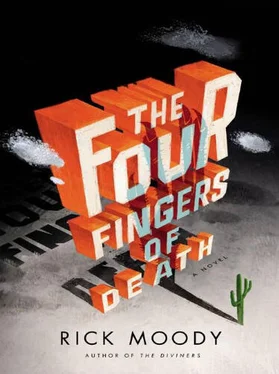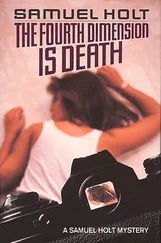His relationship with his own father, who’d died when he was at university in Korea, was noteworthy for its great collegiality, as, he supposed, was often the case in Korean households. His father was not a dispenser of narrowly argued legalistic regulation, short-tempered, and/or selfish. No, his father was gentle, patient, and very funny, with a broad smile and great wisps of white hair that would come loose in the wind, as though he had suddenly grown horns. Father and son were so close that they often walked the streets of the city with an arm around each other. Koo’s friends marveled, and always spoke of elder Koo as the best father on the block , though in truth Woo Lee Koo did not believe his father was anything much out of the ordinary. In fact, it was precisely his ordinariness that made Koo’s father so enviable. He resembled a medical experiment that goes exactly as planned. His father’s reactions were predictable, verifiable, kindly, and perhaps for this reason there was no rebelling against the elder Koo. The elder Koo had had, according to legend, a passionate gambling streak as a young man; he’d worked his way through the casinos of Hong Kong and Macao, betting and losing, winning and betting again. His father was always trying to encourage Woo Lee Koo to take more risks and to revel in the pleasing uncertainty of human events. For these reasons, his death, in a very avoidable car accident, struck Woo Lee Koo hard and continued to trouble him. His father’s death may have been responsible, Koo supposed, for the single-minded way he pursued his medical ambitions, as if to look up from the textbooks would somehow result in a disagreeable flooding of sentiment.
How was it possible, Koo thought, stirring in a third molten spoonful of nonnutritive sugar substitute, that he could have loved his father so much only to feel such disrespect and boredom from Jean-Paul whenever he attempted to talk with the boy? If he tried to describe what it was that he, Koo, did, professionally speaking, which frankly many other conversationalists would find very compelling, if not philosophically electrifying —tissue regeneration, the biological definition of death, elective organ replacement, and so forth — his son would, as they say, glaze over , though his own business, this fanciful proposal for a company devoted to cut-rate cosmetic surgery procedures, was not at all distant from Koo’s research. If he tried to ask the boy about the particulars of his emotional life, his ambitions, his dreams, his sense of responsibility to the world, whether or not he cared to have a family, the younger Koo recoiled as if a branding iron had just been applied. It was only when Koo attempted to discuss theories of management and business practice, subjects on which Koo had only limited information, most of which came from his lawyer, that Jean-Paul made any attempt to engage with his dad. Even then, the boy screwed his face up into the oddest expression, something between a wince and smirk, as if spending forty-five minutes in a room with his own father was akin to proctological examination. At times, Koo was ashamed to admit, he lost his temper with Jean-Paul. Do you know what I went through to bring you here to this country? Has it occurred to you to wonder what your mother would think of what you are doing now? Do you not recall that I have a reputation to protect with the university? That I am a well-known figure in this city, and that I view myself as a guest of the university in this city and this country as a whole? These moments when Koo struck out, in his adopted tongue, did little good. He knew this. Even if he felt better at the moment in which he upbraided the boy, he knew that the words wouldn’t register. Sometimes Jean-Paul himself would lash out in turn: You don’t know what it’s like to grow up now! You don’t know what this place is like, the kinds of pressures I’m under! Most of the kids are just out there on the street doing drugs and going nowhere, and I’m, like, fucking trying to make something of myself . Oh yes, always with that word. That active participle serving as an adjective (or as verb, noun, prefix, suffix). What was the purpose of this word? People said this word for no purpose but to buy time while they attempted to compose their thoughts. And that was not the only problem with his son’s heartfelt speech! Just look at the boy! Koo would have said these words to the arbitrator who might have been present at the conversation. Look at the clothes this boy wears! And look at that wanton girlfriend who trails after him everywhere. There’s a stupidity to her expression! You can’t tell me that one look into the eyes of this girl and you do not feel the vapidity of her expression, as though she has never had a day of hardship in her life, as though she has never struggled for anything. When I look at a specimen of this kind, Koo would have said to the hypothetical arbitrator, I see why this country has fallen upon these hard times. Everywhere I see the expressions, the vacant expressions of the hardened consumer. This can be fixed with a pill! This can be fixed with a cosmetic procedure! This muscle can be made slack! This muscle can be made hard! Please wager your hard-earned minimum-wage dollars here on this collateralized debt obligation! These kids, he would have told the arbitrator, are willing to ride the elevator down, until it comes to rest at the bottom of the bottom-most subbasement, just taking and taking , never once offering back. Koo would think these things, even if he never said them, and never having said them, he would suffer with the unsaid, and he would wait until he was in his garage, with his cryogenically preserved wife, to unburden himself of his many cares. What did it mean that his most lasting and satisfying conversations were with a woman who, if not dead entirely — her tissue was preserved — was nonetheless absent from the conversation in every way?
He had failed as a father, he supposed.
It was in the midst of this ginseng reverie, as the satellite entertainment downlink broadcast some baroque classics, some musical crumpets, that he heard the sound of his son pulling into the driveway. It had been nearly two days since he had seen Jean-Paul. And even though he had just enumerated all the ways in which he couldn’t possibly communicate with the boy, he felt, oddly, a joy and apprehension about Jean-Paul entering the house. It was just better when the young man was around, and since, most days, Jean-Paul wouldn’t tell him where he’d been, there was nothing to do but watch and wait.
The traces of his wife in the boy’s smile. His wife’s eyes, those unearthly green eyes that no Korean boy ever had. His hair was lighter, not jet-black. And there was something almost European about the lad, as if Jean-Paul had walked out of some French gangster picture. He loved these traces of familial history.
Koo recognized immediately, however, that the boy was somewhat upset, even though the worthless girlfriend trailed behind him in some kind of outfit that had no purpose but the purpose of removal.
“Dad,” Jean-Paul exclaimed, “I’m so glad you’re here!”
These were not words that were ordinarily pronounced. In fact, Koo was lost for a moment in the consideration of whether such a thing had ever been said there at all.
“I am very glad to see you too. I was very worried. Would you mind telling me where—”
“There’s something I need to talk to you about, Dad. We’ve just, uh, we’ve just seen, uh, something, like, really horrible and amazing; I don’t even know how to, I don’t even think I can…”
The girl stood in the rear of this tableau, which was the tableau of fathers and sons eager to communicate with each other but short on the skills. She too seemed unsettled, though Koo would have been hard-pressed to describe what was unsettled in her bovine expression, which mostly seemed to want sex or food.
Читать дальше












